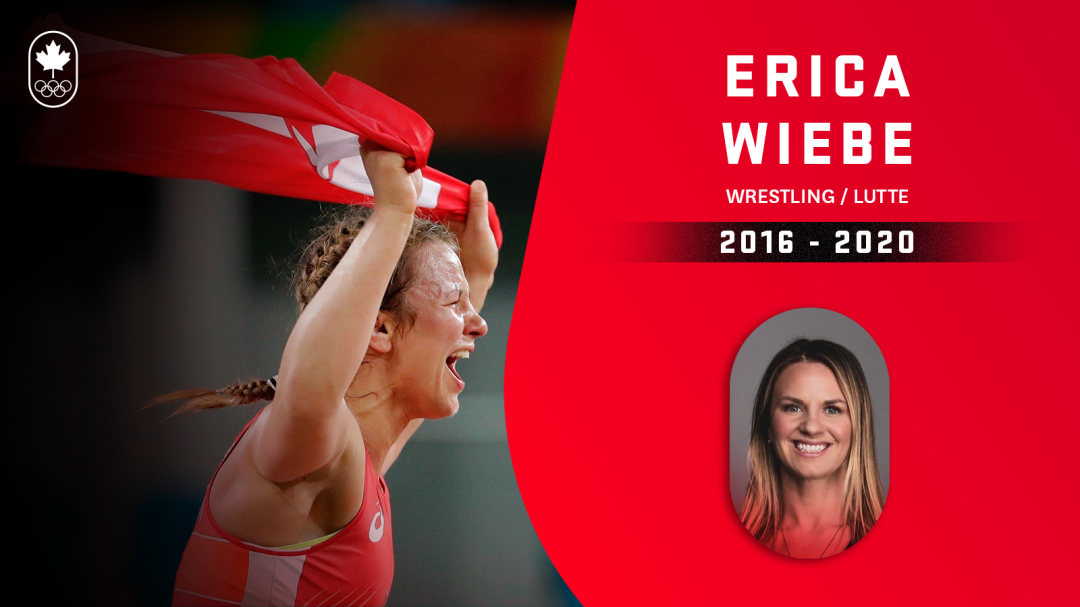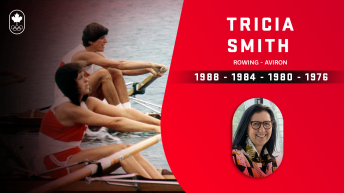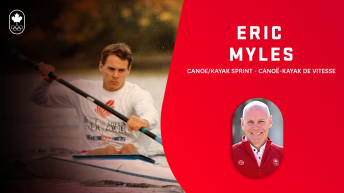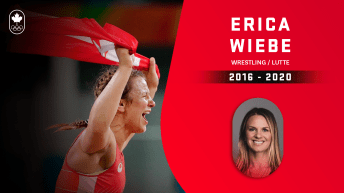Team Behind the Team: Meet Olympic wrestling champion Erica Wiebe, now Manager of Athlete Relations, Safe Sport and DEI at the COC
The Canadian Olympic Committee (COC) is proud to put athletes at the heart of everything it does. At all levels of our organization, from our Board of Directors to our interns, our team is comprised of people who truly believe in the power of sport – including an impressive group of Olympians, Paralympians, Pan American Games athletes, former national team athletes, rec league athletes, and passionate sport lovers. In this series, we’ll share stories from members of our team who have competed at major multi-sport Games and who are now dedicating their professional lives to helping the next generation of Team Canada athletes live their dreams.
Erica Wiebe is one of Canada’s most decorated wrestlers. She is a two-time Olympian who won gold in the women’s freestyle 75kg event at the Rio 2016 Olympics, World Bronze Medalist, as well as a two-time Commonwealth Games champion. Erica holds a Bachelor of Kinesiology and a Bachelor of Arts (Hons) from the University of Calgary, and an MBA from Cornell and Queens. After the Tokyo 2020 Olympics, Erica worked for one of Canada’s fastest growing Fintech Start-ups, but soon found she was pulled back to sport. In 2023, she joined the COC as Manager of Athlete Relations, Safe Sport and DEI.
This interview has been edited for length and clarity.
How did you get into wrestling?
Most of my earliest memories revolve around sport. I loved playing soccer, skiing, hiking, basketball, swimming — pretty much everything as a kid. In grade 7, we had a wrestling week in gym class. But there were no girls’ wrestling teams at that time. In grade 9, there was a sign posted outside the gym door for co-ed wrestling. My best friend and I joined the team and I just fell in love with the sport. It’s funny because in elementary school, the Olympics simply weren’t on my radar. When I started wrestling, women’s wrestling wasn’t an Olympic sport. But then in grade 12, after wrestling had been added to the Games, I wrote in my yearbook, “London 2012. Watch for Me.” I enjoyed sport because I loved competing and I wanted to be the best — London 2012 didn’t quite play out for me, but I did make my first Games in 2016 — and that worked out well.
What did you learn from your experience at the Rio 2016 Olympics?
Ahead of those Games, I had beaten everybody in the world. But I had never done it when it mattered most. I didn’t even make the national team one year out! I really had to reconcile myself with that, like who was I? What defined me? On my day of competition, I woke up in the Olympic Village and I puked in the toilet. I was so nervous. But I was also so ready! I felt like I was 10 feet tall walking into the venue that day. I surrendered myself to whatever was going to happen. I was so prepared mentally, physically, and emotionally. I didn’t care about the outcome because I was 100% in control of what I wanted, which was to have my best performance. When I won the gold, it was surreal. There I was, an Olympic champion. There is so much weight behind that. It’s a title that defines everything about me but also defines nothing about me.
I’ve never chosen the easy road but I’ve also been able to find joy in the darkest moments. One of my favourite quotes is, “Thriving is only something you know definitively in retrospect.” And that ethos translates beyond the mat. In my role today when I’m facing a lot of challenging things and when I’m feeling a sense of extreme discomfort, that’s when I know I’m in my sweet spot.
Before you ever got to Rio, you were involved in the athletes rights movement and working with AthletesCAN as a wrestling representative. Why was that something that was attractive to you?
I put my name forward as a junior athlete to be the athlete representative at Wrestling Canada. I just kind of have this endless appetite and curiosity for understanding how systems work. I also have a desire to make an impact and to build better systems. I got exposed to this whole movement of athletes in Canada through AthletesCAN and it really opened my eyes to the strength of the athlete community and how we could do things better together.
I’ve benefited from the advocacy work of countless women and male allies who carved out a place for women in the sport of wrestling in Canada. And I’ve also witnessed some of the incredible leadership of athlete advocates who are my friends and my inspirations. I have a pretty relentless optimism which helps get through some of these really challenging topics.
So, tell us a little bit more about your current role and what it entails?
I’m the manager of Athlete Relations, Safe Sport and DEI, a newly developed role within the System Excellence team, which I started in April 2023. The role really is at the intersection of those three pillars. We think about building a stronger sport system in Canada with athletes at the centre of it. We recognize the need for sport environments that are free from maltreatment and are built on a foundation of inclusiveness, open to everybody who wants to participate. To me, it is just this perfect confluence of things that are very important for the sport system but also very challenging. It’s a space where I hope I can make a difference.
This role works in some of the more challenging areas of sport. Why is that important to you? What has sport meant for you as an athlete, and as a person?
I feel well positioned to support a lot of the great work that’s being done to elevate the sport system at every level and to make the changes required. It’s something near and dear to my heart because it’s been something that’s deeply affected me. But I also have this relentless, undeniable, unquenchable love, hope and belief in the power of sport at every level because I’ve lived it. I’ve been into communities from literally coast to coast to coast and wrestled and coached youth in those communities who share the joy of sport with me. I think of how sport is needed more than ever globally as our society has become increasingly disconnected, increasingly polarized, and how sport serves such a beautiful opportunity to come together and to challenge each other and to remind ourselves what we’re capable of, both individually and collectively.
If you look five years down the road, what goals do you have for the future. What would you like to see?
I would love to see a Team Canada that reflects the diversity of Canada. Whether that’s geographic diversity or people coming from many different intersections of identity. I also think about new Canadians and the impact that immigration is going to have on the demography of Canada over the next 10 years and how do we integrate them into sport in Canada. On my team, we think about the inequities and difficulties some groups have accessing sport. We think about the challenges around being involved in sport for individuals who identify from equity deserving groups like racialized minorities, individuals who identify as 2SLGBTQ1+ populations. So, I think an outcome I’d like to see is all Canadians see themselves represented in Team Canada and have pathways to get to high performance with Team Canada – if that’s what they choose.
It’s really cool to me when I tell people about my job, my friends, teammates, co-workers, others in the sport system, they all say this is perfect for you. When I ask them why, they say, it is all the things that you have been passionate about for years. That makes it so validating for me to be in this position. It feels similar to me to what it means to represent Canada; it’s an incredible honour but also an incredible responsibility, and I’m excited about both the opportunity and challenge.







